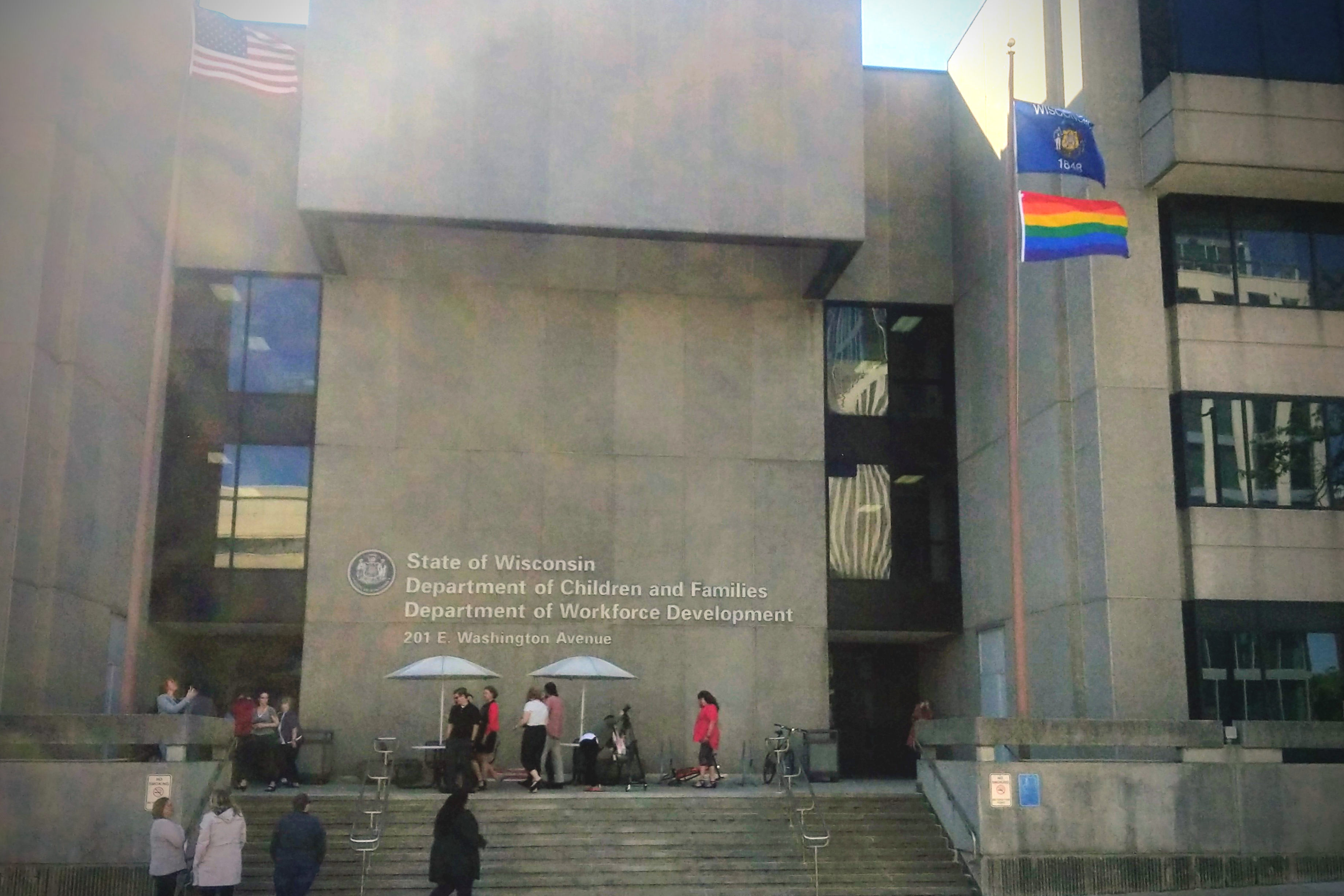Outdated or Unsupported Browser Detected
DWD's website uses the latest technology. This makes our site faster and easier to use across all devices. Unfortunatley, your browser is out of date and is not supported. An update is not required, but it is strongly recommended to improve your browsing experience. To update Internet Explorer to Microsoft Edge visit their website.
June 24, 2021

An op-ed by Amy Pechacek; Secretary-designee, Wisconsin Department of Workforce Development
For the third straight year, Wisconsin's Department of Workforce Development (DWD) is flying the Pride flag outside several DWD office buildings across Wisconsin. This flag is a visual representation of our annual celebration of Pride Month, which honors all the efforts taken to achieve equal justice and equal opportunity for lesbian, gay, bisexual, transgender, and queer (LGBTQ) individuals.
As the head of DWD, the agency responsible for enforcing our state's anti-discrimination laws, I encourage all of you to use this month to educate yourselves on ways you can advance equal rights year-round.
In 1982, Wisconsin was the first state to sign a law protecting gay and lesbian Wisconsinites from discrimination in employment, housing, and public accommodations under then Governor Lee Sherman Dreyfus. Wisconsin and the nation have made great strides since then, and that progress can be seen in public attitudes. A vast majority of Americans now support laws that protect LGBTQ people against discrimination. While we've seen great improvements toward equal protections and treatment under the law, there is still more to be done to end discrimination and advance equal opportunities.
A recent survey by Realtor.com found that nearly 30 percent of LGBTQ individuals reported experiencing discrimination in the housing market. Of all groups, the transgender community had the highest occurrence of housing discrimination at an alarming 44 percent.
Specific to the workforce, in more than half of states, an individual can still be fired because of their sexual orientation or gender identity. According to the National Center for Transgender Equality, more than one in four transgender people have lost a job due to bias, and more than 75% have experienced some form of workplace discrimination. Refusal to hire, privacy violations, harassment, and even physical violence on the job are common occurrences and are experienced at even higher rates by transgender people of color.
Further, Insider recently reported that of the 14 million U.S. adults and 2 million youth who identify as LGBTQ, 5 million work in industries that were significantly impacted by the pandemic, including hospitality, retail, and education. And, LGBTQ households experienced disproportionately higher job losses at 64%, compared to 45% for non-LGBTQ households. These statistics are concerning and demonstrate how the pandemic has further exacerbated long-standing inequalities. That's why it is so important that our workforce recovery efforts provide specific and direct support to those most impacted by the COVID-19 pandemic.
Governor Evers and his administration are committed to promoting policies and programs that ensure fair, inclusive, and equitable workplaces. Here at DWD, our role in creating an LGBTQ inclusive workforce is to protect and promote the rights of people of all sexual orientations and gender identities and expressions, while offering employers the tools they need to build a workplace culture that works for everyone.
DWD's Equal Rights Division continues to investigate workplace discrimination cases and hold employers accountable when discrimination occurs. Both workers and employers can learn more about their rights and responsibilities on our eWorkBoard. We also investigate discrimination in housing and enforce the Wisconsin Fair Housing Law, which broadly prohibits discrimination when selling, renting, financing, and contracting to construct housing.
It's important to recognize that enforcement of these laws is through a complaint-based system, which can feel like an intimidating process if you are the one being discriminated against, even if the law protects you against retaliation. For allies, it's incredibly important to educate yourself on the law so that, if and when a situation arises, you can support your colleagues by speaking up yourself against any discriminatory actions or policies, validate any concerns they may raise, and share your willingness to serve as a corroborating witness if needed during the investigation process.
Of course, government intervention and enforcement alone are not going to ensure that all workers are treated fairly, with dignity and respect. We encourage employers and organizations to take it upon themselves to more effectively expand employment for LGBTQ people and promote an inclusive work environment that is free from discrimination.
Employers, landlords, and housing associations should proactively enact nondiscrimination policies and practices that are specific to sexual orientation and gender identity. Once in place, management should enforce these policies and address discriminatory practices head-on at all levels of their organizations.
Throughout my years of service in state government, I have seen firsthand the benefits of creating an environment that embraces the diverse talents of every person. Providing a welcoming environment for LGBTQ people in the workplace is about more than just equality – it actively improves workplace productivity and retention while ensuring our workforce accurately reflects our society.
This month, as we celebrate our progress toward the full equity and inclusion of LGBTQ people in our communities, as well as our first steps toward a post-pandemic reality, DWD remains committed to advancing equal opportunities and protections for all.
Happy Pride!